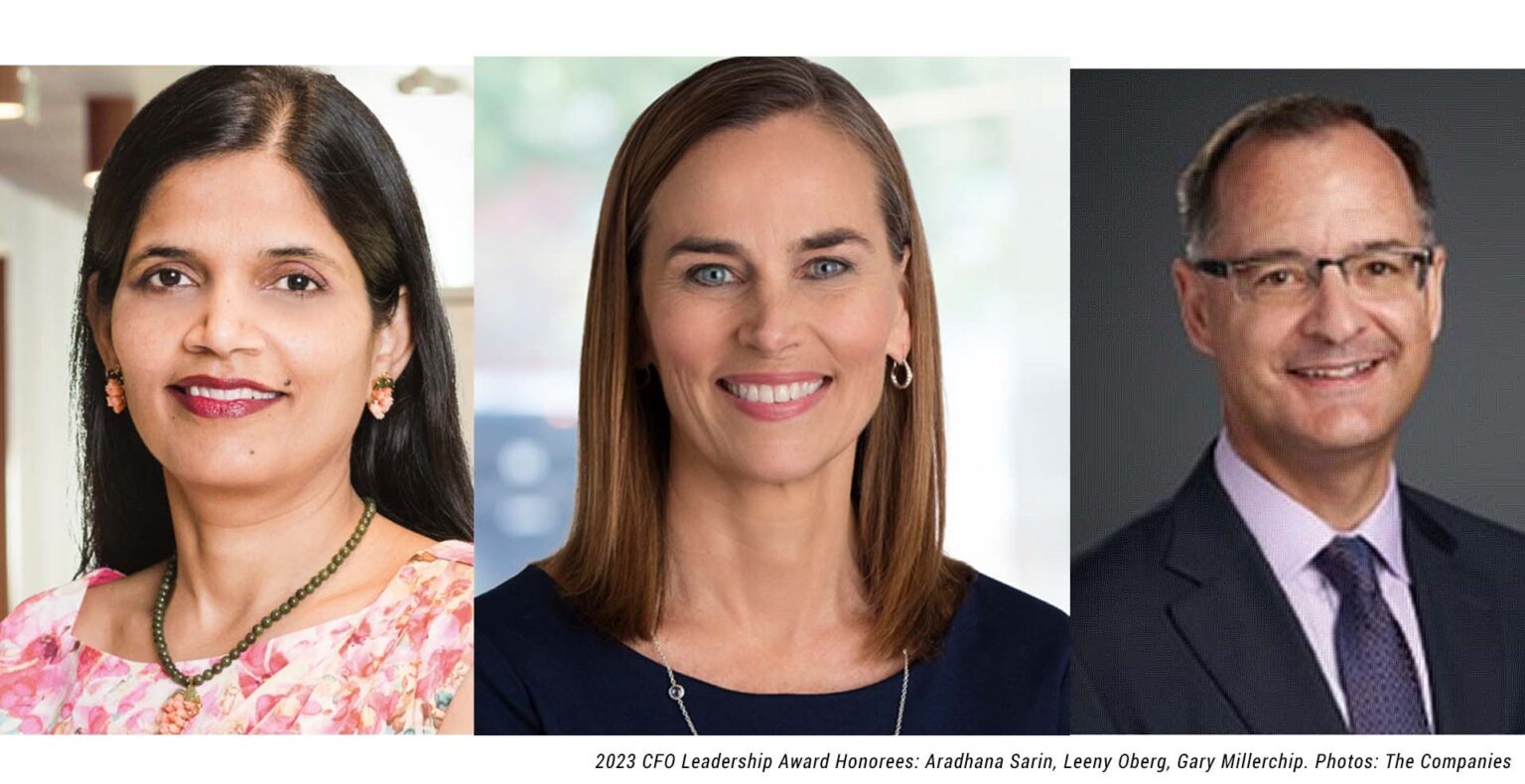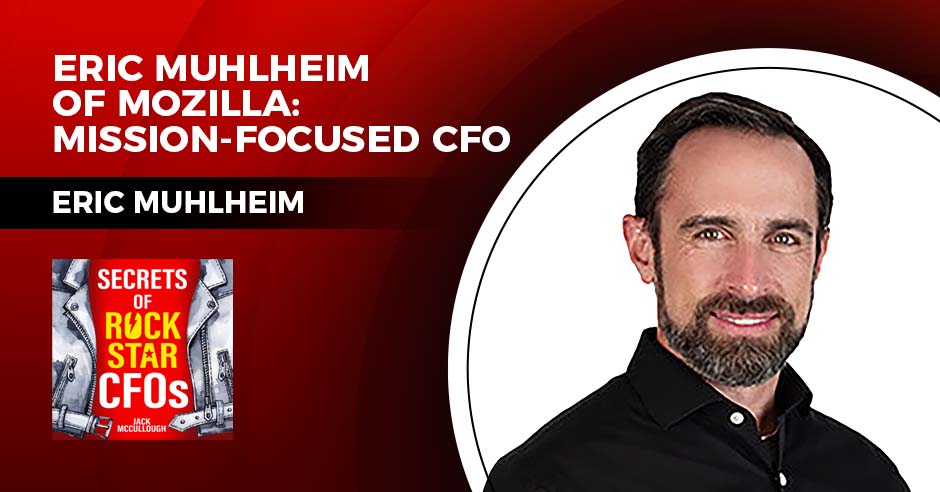The three first recipients of the CFO Leadership Awards were recognized distinctly for strengths and accomplishments in certain areas. But it’s a testament to how the CFO role is changing that each of them had lessons to share at the recent Strategic CFO Forum that applied to the other areas and to the ever-broadening purview of the chief financial officer.
Leeny Oberg, CFO and executive vice president of Marriott International, was recognized as Strategic Leader of the Year in the inaugural CFO Leadership Awards by StrategicCFO360 and the CFO Leadership Council, both part of Chief Executive Group. Aradhana Sarin, AstraZeneca’s executive director and CFO, was honored as Team Leader of the Year. And Gary Millerchip, senior vice president and CFO of Kroger, was awarded the Digital Visionary of the Year honor.
Yet in the views they expressed in a panel discussion following the awards ceremony, the three underscored how successful CFOs in the modern era are becoming proactive on a number of fronts in reshaping the role for faster-changing and less-predictable times. Among their advice:
Get back on your haunches. The three agreed that macroeconomic and geopolitical uncertainties introduced by the pandemic seem to have become part of the new landscape for doing business.
“There are things within your control and things that aren’t, and you can only deal with the things that are,” Sarin noted. “You can make different choices with your strategy and your resource allocation, and pivot more quickly. But there is really no recipe. So you have to become OK with uncertainty, and we all have to make decisions with imperfect information. We have to be OK with that.”
But that doesn’t mean CFOs can’t help companies prepare better for the next eventuality. It’s crucial for companies “to be at the ready for anything related to the ongoing operations of the company,” Oberg said. “It’s a natural part of the business. You have to be prepared. I can’t overestimate the importance of business continuity and disaster recovery.”
One way for CFOs to help in that regard is to accelerate the scenario-planning process to, say, a quarterly rather than annual exercise, Millerchip said. “We learn how to make decisions faster because we have to,” he said. Oberg suggested broadening scenario planning across more possibilities and practicing responses “even when you’re not absolutely required, to help you get better at that.”
Lean into technology. More CFOs find themselves with greater ties to—or even responsibility for—companies’ technological evolution. But regardless, the awardees said, CFOs must be intimately involved with their companies digital-transformation strategies because of how important they’ve become.
“Any company that operates needs to think of itself as some sort of technology company,” Millerchip said. “The danger is that it becomes a bottomless pit of investment without delivering returns.”
Part of Kroger’s technology approach, he said, is to “focus on our long-term strategy for customers and associates, and about how technology will be an accelerator of that plan, rather than making untargeted goals and aspirations for the company” based on technology investments. As a result, he said, the grocery retailer has not only invested $12 billion in its digital business and set up data gathering that helps with customer relationships and loyalty, but also used technology to cut costs by $1 billion over the last five years.
Marriott is about one year into its own digital transformation that “will entirely transform the way [customers] communicate with us online,” Oberg said, as well as overhaul how employees serve guests. In helping lead this change, she said, the company has learned “to not let perfection be the enemy of the good.” The biggest learning has been to accept “saving some things to do later” while getting as much traction as possible, as quickly as possible, on the transformation.
AstraZeneca is learning to use technology not just as “an enabler” but as a competitive advantage, Sarin said. This includes coming up with use cases for new AI technology, and testing them, as well as pushing financial staffers “to build muscle with technology. We don’t expect [all of them] to start writing code, but we do expect them to [build] knowledge on [using] technology for finance.”
Grapple with talent. Despite many thousands of layoffs by Big Tech companies, struggling banks and many others, bringing the “best and brightest” into their operations remains a challenge, the awardees agreed. So does retaining those people.
“What motivates people to come, and what motivates them to stay, are two different things,” Sarin said. “What motivates them to stay is a lot about how they associate themselves with the purpose of the organization, and what they feel they’re contributing, [and] are they” being developed. “Those aren’t the reasons they join.”
Getting employees to stay often boils down to whether managers “have their backs” and are able to “get people to bring their whole selves to work every day, accepting them for who they are. Investing in people is important,” she says, noting it isn’t easy to get it right. “If you invest in them, then they [feel equipped] to leave, but if you don’t invest in them, they don’t want to stay.”
Oberg said that “moving people around frequently and getting them exposed to different things is crucial, because attention spans are shorter than they used to be” and varied exposure “early in their career is critical.”
Just survive. When progress in these areas is stalled and CFOs simply need to fight to hold their ground, Millerchip advised, prioritize prioritization. Develop talent, because organizations may care “less about your impact than about how you impact other people.” And “use your influence as CFO to make the company better by being a great partner to other stakeholders.”
Oberg advised demonstrating “curiosity about how the business works.” And, “Communicate, whether written, in meetings or in verbal presentations. In today’s world, you can’t overestimate the importance of that.” Take time to think, Millerchip advised. “Step back,” he said. “It’s easy in a role like this to have your calendar manage you and be stuck in the routine of what the job is like. Take a step back to carve out time to really think about what’s changing and how it impacts business and your role.”








